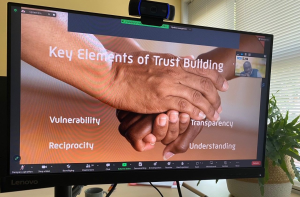Last week, we launched iCRA’s ‘Expert Talk’ series. Expert Talks are interactive webinars where members of iCRA’s network to share their expertise on a subject related to trust and the agri-food sector. These events are free and open to anyone interested in iCRA’s work. Our first Expert Talk was led by Gerald Mutua. Gerald is one of iCRA’s partners and the Director of CropCare Technologies in Kenya. His Expert Talk explored the neuroscience behind trust-building. In this Expert Bite we recap some of the fascinating insights Gerald shared and provide practical tips to help you build and maintain trust in your professional relationships.
Understanding Trust Through Biology
The prefrontal cortex is the part of the brain responsible for decision-making and social behavior. It plays a crucial role in developing trust. Remarkably, it takes just seven seconds for us to assess a relationship or person as trustworthy. Conversely, the amygdala, which processes emotions like fear and distrust, can make us distrustful in as little as 0.07 seconds.
Key Elements of Trust Building
There are four key elements that encourage trust to form in a partnership. By understanding each of these elements we can work to consciously build trust. Check out the practical tips included below:

A handshake symbolizing trust and collaboration, as explored in iCRA’s Expert Bite 025 on the neuroscience of building partnerships
Vulnerability
Sharing personal vulnerabilities and experiences can signal trust and create a deeper connection. Being open encourages others to reciprocate, creating a cycle of trust that grows. So, embrace vulnerability: Practice self-disclosure by sharing your own challenges and experiences. This can foster a deeper connection and encourage your partners to be open as well. For instance, start meetings by discussing recent successes and challenges, demonstrating your openness.
Reciprocity
When one party engages in self-disclosure, it often encourages the other to share as well. This mutual exchange helps build a sense of openness and trust within the relationship. So, promote reciprocity: When you share your thoughts and feelings, invite your partners to do the same. Create an environment where mutual sharing is valued and encouraged. Use open-ended questions to facilitate this exchange.
Transparency
Being clear and open about your actions and intentions builds credibility and trust. Transparency reduces uncertainty and risk. It allows partners to feel secure in the relationship. So, maintain transparency: Keep your partners informed about your actions and decisions. Share your plans and any changes openly to build credibility. Regular updates and clear communication channels can help maintain this transparency.
Understanding
Taking the time to understand your partners’ needs, challenges, and perspectives shows empathy and respect. It can also help you to understand in what ways working together could be mutually beneficial. This common understanding strengthens the trust bond. So, cultivate understanding: Show empathy by actively listening and acknowledging your partners’ perspectives and concerns. This can help you better understand their needs and build a stronger trust bond. Make a habit of summarizing what you’ve heard to ensure mutual understanding.
By leveraging the neuroscience of trust, you can create more effective and resilient professional partnerships. Embrace vulnerability, reciprocity, transparency, and understanding in your interactions. With the right approach, you can create meaningful and lasting professional relationships. For more insights and training on building trust in agribusiness partnerships, connect with us at iCRA.
Written by Gerald Mutua
Missed the session? You can check out this slides and a recording of Gerald’s Expert Talk. If you are interested in hosting your own iCRA Expert Talk on a subject related to trust an agri-education and agribusiness then reach out to us at communication@icra.global.
Photo by Cytonn Photography on Unsplash
Read more iCRA Expert bites & Expert talks

